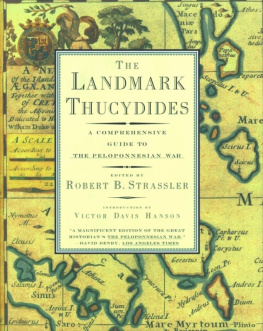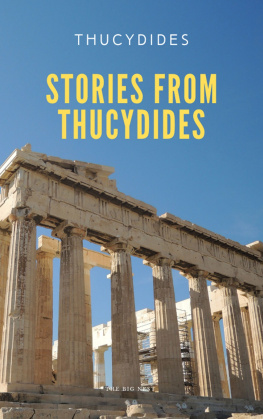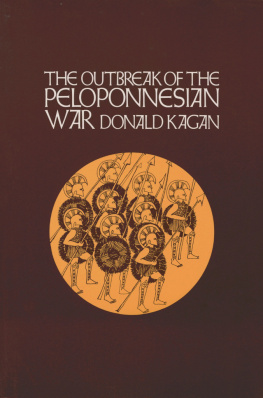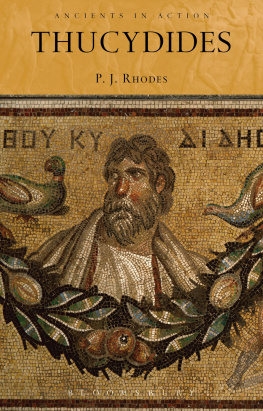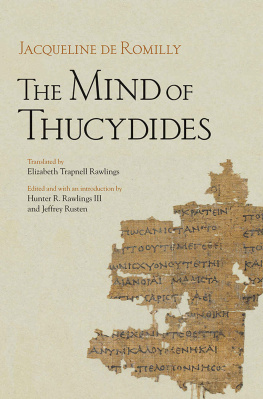Chapter I.
The State of Greece from the earliest Times to the Commencement of the Peloponnesian War
Thucydides, an Athenian, wrote the history of the war between the Peloponnesians and the Athenians, beginning at the moment that it broke out, and believing that it would be a great war and more worthy of relation than any that had preceded it. This belief was not without its grounds. The preparations of both the combatants were in every department in the last state of perfection; and he could see the rest of the Hellenic race taking sides in the quarrel; those who delayed doing so at once having it in contemplation. Indeed this was the greatest movement yet known in history, not only of the Hellenes, but of a large part of the barbarian world I had almost said of mankind. For though the events of remote antiquity, and even those that more immediately preceded the war, could not from lapse of time be clearly ascertained, yet the evidences which an inquiry carried as far back as was practicable leads me to trust, all point to the conclusion that there was nothing on a great scale, either in war or in other matters.
For instance, it is evident that the country now called Hellas had in ancient times no settled population; on the contrary, migrations were of frequent occurrence, the several tribes readily abandoning their homes under the pressure of superior numbers. Without commerce, without freedom of communication either by land or sea, cultivating no more of their territory than the exigencies of life required, destitute of capital, never planting their land (for they could not tell when an invader might not come and take it all away, and when he did come they had no walls to stop him), thinking that the necessities of daily sustenance could be supplied at one place as well as another, they cared little for shifting their habitation, and consequently neither built large cities nor attained to any other form of greatness. The richest soils were always most subject to this change of masters; such as the district now called Thessaly, Boeotia, most of the Peloponnese, Arcadia excepted, and the most fertile parts of the rest of Hellas. The goodness of the land favoured the aggrandizement of particular individuals, and thus created faction which proved a fertile source of ruin. It also invited invasion. Accordingly Attica, from the poverty of its soil enjoying from a very remote period freedom from faction, never changed its inhabitants. And here is no inconsiderable exemplification of my assertion that the migrations were the cause of there being no correspondent growth in other parts. The most powerful victims of war or faction from the rest of Hellas took refuge with the Athenians as a safe retreat; and at an early period, becoming naturalized, swelled the already large population of the city to such a height that Attica became at last too small to hold them, and they had to send out colonies to Ionia.
There is also another circumstance that contributes not a little to my conviction of the weakness of ancient times. Before the Trojan war there is no indication of any common action in Hellas, nor indeed of the universal prevalence of the name; on the contrary, before the time of Hellen, son of Deucalion, no such appellation existed, but the country went by the names of the different tribes, in particular of the Pelasgian. It was not till Hellen and his sons grew strong in Phthiotis, and were invited as allies into the other cities, that one by one they gradually acquired from the connection the name of Hellenes; though a long time elapsed before that name could fasten itself upon all. The best proof of this is furnished by Homer. Born long after the Trojan War, he nowhere calls all of them by that name, nor indeed any of them except the followers of Achilles from Phthiotis, who were the original Hellenes: in his poems they are called Danaans, Argives, and Achaeans. He does not even use the term barbarian, probably because the Hellenes had not yet been marked off from the rest of the world by one distinctive appellation. It appears therefore that the several Hellenic communities, comprising not only those who first acquired the name, city by city, as they came to understand each other, but also those who assumed it afterwards as the name of the whole people, were before the Trojan war prevented by their want of strength and the absence of mutual intercourse from displaying any collective action.
Indeed, they could not unite for this expedition till they had gained increased familiarity with the sea. And the first person known to us by tradition as having established a navy is Minos. He made himself master of what is now called the Hellenic sea, and ruled over the Cyclades, into most of which he sent the first colonies, expelling the Carians and appointing his own sons governors; and thus did his best to put down piracy in those waters, a necessary step to secure the revenues for his own use.
For in early times the Hellenes and the barbarians of the coast and islands, as communication by sea became more common, were tempted to turn pirates, under the conduct of their most powerful men; the motives being to serve their own cupidity and to support the needy. They would fall upon a town unprotected by walls, and consisting of a mere collection of villages, and would plunder it; indeed, this came to be the main source of their livelihood, no disgrace being yet attached to such an achievement, but even some glory. An illustration of this is furnished by the honour with which some of the inhabitants of the continent still regard a successful marauder, and by the question we find the old poets everywhere representing the people as asking of voyagers Are they pirates? as if those who are asked the question would have no idea of disclaiming the imputation, or their interrogators of reproaching them for it. The same rapine prevailed also by land.
And even at the present day many of Hellas still follow the old fashion, the Ozolian Locrians for instance, the Aetolians, the Acarnanians, and that region of the continent; and the custom of carrying arms is still kept up among these continentals, from the old piratical habits. The whole of Hellas used once to carry arms, their habitations being unprotected and their communication with each other unsafe; indeed, to wear arms was as much a part of everyday life with them as with the barbarians. And the fact that the people in these parts of Hellas are still living in the old way points to a time when the same mode of life was once equally common to all. The Athenians were the first to lay aside their weapons, and to adopt an easier and more luxurious mode of life; indeed, it is only lately that their rich old men left off the luxury of wearing undergarments of linen, and fastening a knot of their hair with a tie of golden grasshoppers, a fashion which spread to their Ionian kindred and long prevailed among the old men there. On the contrary, a modest style of dressing, more in conformity with modern ideas, was first adopted by the Lacedaemonians, the rich doing their best to assimilate their way of life to that of the common people. They also set the example of contending naked, publicly stripping and anointing themselves with oil in their gymnastic exercises. Formerly, even in the Olympic contests, the athletes who contended wore belts across their middles; and it is but a few years since that the practice ceased. To this day among some of the barbarians, especially in Asia, when prizes for boxing and wrestling are offered, belts are worn by the combatants. And there are many other points in which a likeness might be shown between the life of the Hellenic world of old and the barbarian of to-day.




